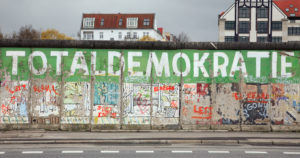

July 2022, Volume 33, Issue 3
How Viktor Orbán Wins
The case of Hungary shows how autocrats can rig elections legally, using legislative majorities to change the law and neutralize the opposition at every turn, no matter what strategy they adopt.
397 Results


July 2022, Volume 33, Issue 3
The case of Hungary shows how autocrats can rig elections legally, using legislative majorities to change the law and neutralize the opposition at every turn, no matter what strategy they adopt.
July 2024, Volume 35, Issue 3
Georgian Luka Gviniashvili on protesting the foreign-agent bill; a speech by Evgenia Kara-Murza to the Parliamentary Assembly of the Council of Europe; an Iranian rapper denounces Toomaj Salehi’s death sentence; Carl Gershman on Mário Soares and the fiftieth anniversary of Portugal’s Carnation Revolution; a Ugandan political prisoner’s court-martial hearing; María Corina Machado wins the Global…


July 2024, Volume 35, Issue 3
The “crisis” of democracy is a crisis of representation. New parties, some of which are populist in troublingly illiberal ways, are arising from this moment. The danger that they pose is not that they are antidemocratic, but that they are antiliberal.


October 2022, Volume 33, Issue 4
Democracies are under stress, but they are not about to buckle. The erosion of norms and other woes do not spell democratic collapse. With incredibly few exceptions, affluent democracies will endure, no matter the schemes of would-be autocrats.


April 2020, Volume 31, Issue 2
Is there a recipe for defeating a populist? A novel campaign strategy based on inclusion and public responsiveness may show how to beat the odds in a competitive authoritarian system.


January 2022, Volume 33, Issue 1
Whether democracy regains its footing will depend on how democratic leaders and citizens respond to emboldened authoritarians and the fissures within their own societies.


April 2024, Volume 35, Issue 2
Liberal societies are those which offer refuge from the very people they empower—through individual choice, mobility, and the possibility of exit. This is the form of liberty that most clearly elevates the liberal project.


April 2024, Volume 35, Issue 2
The problem for democracy today is not capitalism; it is a decline in public honesty and civility. But there is an opportunity to revive our sense of national community, if we seize it.


April 2023, Volume 34, Issue 2
There have been numerous waves of protest against the country’s corrupt theocracy. This time is different. It is a movement to reclaim life. Whatever happens, there is no going back.

January 2018, Volume 29, Issue 1
To safeguard their ill-gotten gains, kleptocrats rely on a web of transnational relationships and the complicity of Western fixers.


October 2022, Volume 33, Issue 4
Opposition movements often boycott rigged polls rather than risk legitimizing an autocrat. It is usually a mistake. Here is the playbook for how one opposition seized the advantage.

January 2018, Volume 29, Issue 1
Despite worries that terror groups can turn open societies’ very openness against them, the numbers reveal that liberal democracies enjoy significant advantages in resisting the threat of terrorism.


April 2021, Volume 32, Issue 2
The swelling pessimism about democracy’s future is unwarranted. Values focused on human freedom are spreading throughout the world, and suggest that the future of self-government is actually quite bright.

April 2019, Volume 30, Issue 2
Xi reads Tiananmen as a cautionary tale, and he has sought to centralize power and reverse years of ideological atrophy. By controlling the past, he is trying to determine how the Chinese will view their present and future.


January 2021, Volume 32, Issue 1
India’s Constitution has long seemed stable, but the rise of an ethnic, absolute, and opaque state is changing the constitutional order in momentous and disturbing ways.


January 2024, Volume 35, Issue 1
Autocrats have found a new way to turn citizens against liberal democracy: convincing them that LGBTIQ rights, granted and protected in much of the West, pose a threat to their nation and its values.


October 2019, Volume 30, Issue 4
Despite the lack of electoral turnover in ANC-ruled South Africa, the country’s successful resistance to efforts at “state capture” under former president Jacob Zuma testifies to the vitality of its democracy.


January 2020, Volume 31, Issue 1
Is liberal democracy the endpoint of history? The ongoing democratic recession, growing disaffection among citizens, and rising populism pose new challenges to this view. Yet testing Francis Fukuyama’s much-criticized thesis requires us to consider not only liberal democracy’s internal contradictions, but also those of its authoritarian rivals.

January 2018, Volume 29, Issue 1
Despite high hopes for progress toward democracy, the military’s power remains stubbornly entrenched, while Aung San Suu Kyi seems to lack the skills to run the government effectively.

July 2018, Volume 29, Issue 3
Thirty years ago in Central and Eastern Europe, belief in an open society and a sense of reasserted national and indeed European identity seemed to go hand-in-hand. But that was then.